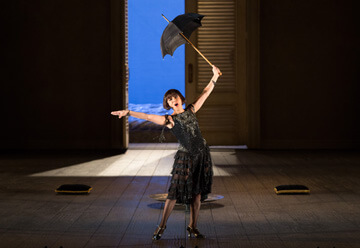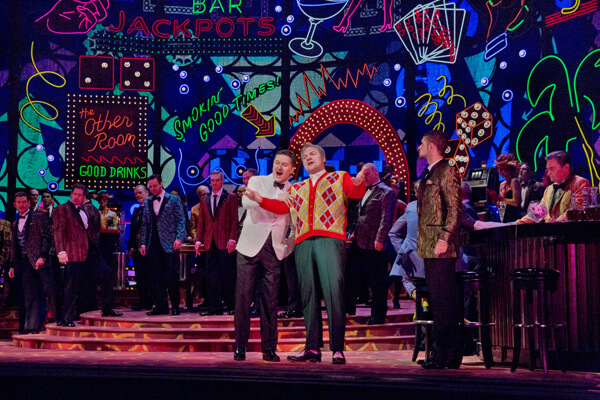The Metropolitan Opera’s 2019 “Ring Cycle” seems to improve with each installment. The “Siegfried” matinee on April 13 provided the debut of German tenor Stefan Vinke, who proved a revelation, scoring a personal triumph. Usually, the Siegfried interpreter is the weak point of any “Ring” production — invariably the performer looks and sounds too old for the character who is supposed to be an athletic, teenage golden boy. Siegfried is onstage constantly in all three acts and his music is punishing declamation written close to the upper break of the tenor voice. “Siegfried” is supposed to be the joyous “scherzo” section of the “Ring.” But too often with a weather-beaten and charmless lout as the hero, it is as much an endurance test for the audience as for the leading tenor.
Vinke bounded onstage with exuberance, energy, and total self-possession. The voice is big and penetrating with a true tenor resonance and placement — Vinke is not a pushed-up baritone like many a heldentenor before him. One never got the sense of husbanding the resources, which worried me, but he sailed through Act I, climaxing with an exultant forging song with excellent rhythm on the anvil and firmly-attacked high notes. Even more impressive were soft phrases in Acts I and II as Siegfried muses on his lost mother and the beauties of nature. Vinke’s bright steely tone continued with unabated brilliance in Act II, and the Act III love duet found the debutant taking an interpolated final high C with Brünnhilde. Vinke is tall and sturdy, well-proportioned and long-limbed. He wore the blond metal rocker wig with panache and has a dazzling broad smile. Even more wondrous, Vinke proved a physically responsive and spontaneous stage animal. He moves naturally and listens and reacts to his stage partners. I loved how he mouthed Mime’s whinging complaints of ingratitude along with him like a bratty adolescent with attitude — Siegfried had heard this speech too many times before.
One of the great pleasures of Act I was hearing three native German-speaking singing-actors explore the text. Gerhard Siegel as Mime has a real voice, and the nasal whine is in the inflections and not the basic tone (Siegel has sung the title role in small German houses). Siegel’s acting was full of quirky and spontaneous details so that Mime never became merely tiresome. He squared off brilliantly against Michael Volle as the Wanderer in the Act I scene where Mime and Wotan trade riddles. Volle’s expansive heroic baritone had lieder singer detail in his delivery of text. The scene where Wotan renounces power and resigns himself to the doom of the gods in Act III was shattering.
As the newly awakened and humanized Brünnhilde, Christine Goerke created a positive and engaging heroine. The “Siegfried” Brünnhilde is the shortest and highest of the three and the least suited to Goerke’s dark, middle-heavy dramatic soprano. She removed much of the dark mezzo weight out of her tone and kept her placement high. There was a loss of some of her characteristic rich dark timbre but the high B’s and C were attacked cleanly though not exulted in. Goerke had great chemistry with Vinke, overcoming the Valkyrie’s maidenly fears in “Ewig war ich” and then surrendering to sexual passion on a shared orgasmic high C. Karen Cargill as Erda produced a rich mezzo-soprano and her dark tone and firm legato grounded the character. Cargill lacks the mystic colors of a true deep contralto. Tomasz Konieczny as Alberich, like the role originator in this production, Eric Owens, has too prepossessing and beautiful a voice for such a despicable and villainous character. Like the other “character” roles in this “Ring” revival, this is a real voice used very musically but with firm dramatic intent. On the low end of the vocal spectrum, Dmitry Belosselskiy’s Fafner was aided by electronic enhancement but the black-toned resonance was very much his own and very effective. On the high end, Erin Morley as the Woodbird has a freshly innocent woodwind timbre that was ideal for the role.
Philippe Jordan’s conducting has improved with each “Ring” opera. This “Siegfried” was full of lyrical dash and dramatic propulsion. There were beautiful details savored along the way but the music always moved forward with energy and purpose. With such a superb cast, Lepage’s machine was a neutral factor. I was more bothered by Etienne Boucher’s dark lighting which threw a pall over each scene — including the springtime forest in Act II and the dazzling sunrise in Act III. I suppose the onstage darkness was necessary for Pedro Pires’ computer video projections but this shining cast and the Metropolitan Opera Orchestra radiated their own light on the proceedings.
The seductive and destructive power of dreams is explored in “Julietta, or the Key of Dreams” (1938) by Czech composer Bohuslav Martinů. This surrealist opera was adapted by the composer from the French fantasy “Juliette, ou La clé des songes” by Georges Neveux. Leon Botstein and the American Symphony Orchestra presented the New York premiere of Martinů’s three-act opera on March 22 in a Carnegie Hall concert reading. The story concerns Michel, a Parisian bookseller who returns to a sleepy seaside town in search of his dream girl, Juliette, whose voice entranced him singing from a balcony three years before. The townspeople seem to be having a collective loss of memory and by the end of a conversation have no memory of what they said earlier or of whom they were speaking to. They cannot remember their own past and steal or buy the memories of others.
Michel meets his Julietta in a forest in Act II but she seems to be only pretending to remember him and later mocks him. Driven to hysteria, he shoots her but only finds her silk scarf in the forest. In Act III, we enter the Central Office of Dreams where Michel has a choice of waking up or becoming lost to the world forever in an eternal state of waking disconnection from reality.
I was expecting an airy impressionistic French score in the style of Satie, young Poulenc, or Dukas, but Martinů’s musical vocabulary, though tonal, is darker and more muscular. Not impressionistic but expressionistic. Martinů was living in Paris at the time he composed the opera but fled to New York during World War II. His style has elements of Janácek mixed with symphonic Richard Strauss and American jazz — there is a hint of Gershwin’s classical mode in “Porgy and Bess.” The vocal lines are conversational and declamatory but intermixed with sprechtstimme and stretches of spoken dialogue recited over the orchestra or unaccompanied. There is a strong lyrical impulse but the general atmosphere evokes existential angst and psychic dislocation. We are in the world of Kafka rather than Jean Cocteau at his most whimsical — this dream will turn into a nightmare at any moment. The sense of impending doom perhaps reflects the clouds over Europe at the time Martinů composed “Julieta.” Though Martinů prepared a French-language version of the opera, ASO performed the sung portions of the work in the Czech language of the world premiere performance in Prague under Václav Talich on March 14, 1938. The spoken portions were delivered in an English translation by Alex Zucker.
The opera has a large cast many of whom played multiple roles. The versatile lyric tenor Aaron Blake brought great vocal and intellectual focus to the long and difficult role of the dreaming protagonist Michel. As Julietta , the object of his fantasies, Sara Jakubiak revealed a firm soprano of substance and many colors — some dark and complex and others brightly radiant. The virtuosic character tenor David Cangelosi performed various equivocal authority figures from the Police Chief to the Clerk in the Central Office of Dreams with brilliant vocal and dramatic flair.
There were no weak links in the supporting cast. Standing out were the always droll and characterful bass-baritone Kevin Burdette and the sassy and exuberant mezzo Raehann Bryce-Davis as various dream figures. Philip Cokorinos, Alfred Walker, and Tichina Vaughn brought robustly resonant tones and authority to their multiple assignments. Mezzo Rebecca Jo Loeb radiated positive youthful brightness in her juvenile trouser roles.
Botstein excels in this kind of early 20th century Central European post-Romantic repertory and he maintained firm control of American Symphony Orchestra and the Bard Festival Chorale in Martinů’s tricky and elusive score.
As the ASO operatic rediscoveries go, this one seems worth staging and hearing again though I believe that the composer’s French-language version might be more accessible to American audiences. In the opera house, “Julietta” would require a visionary director and imaginative design.


















